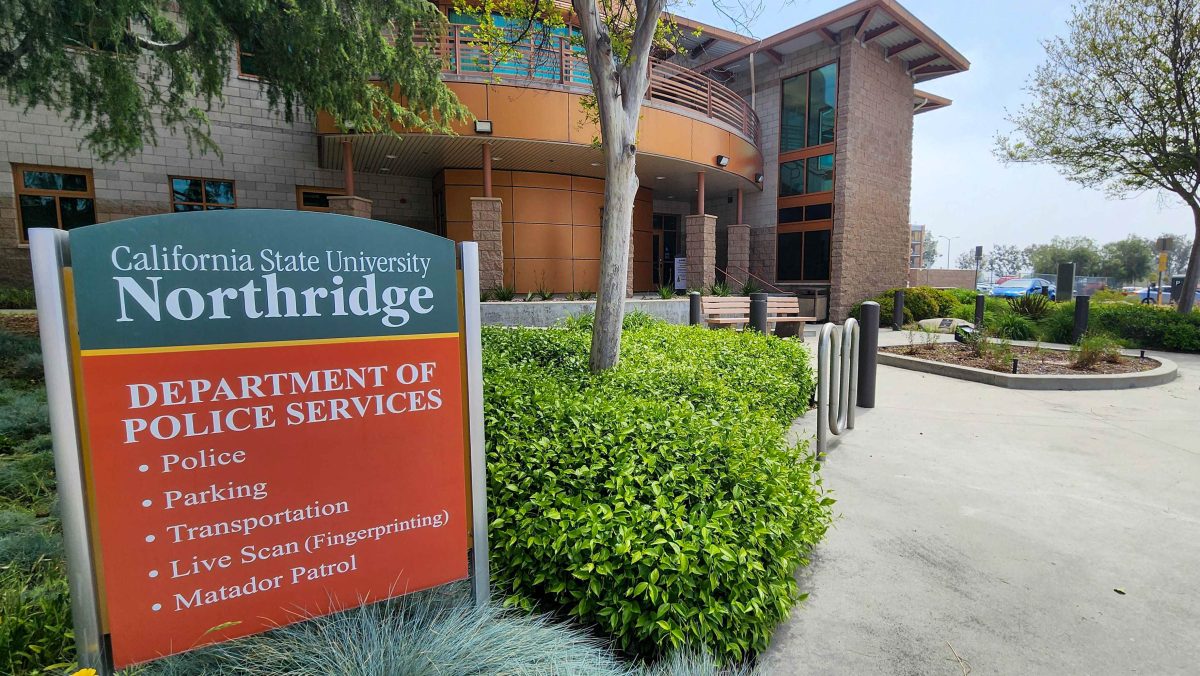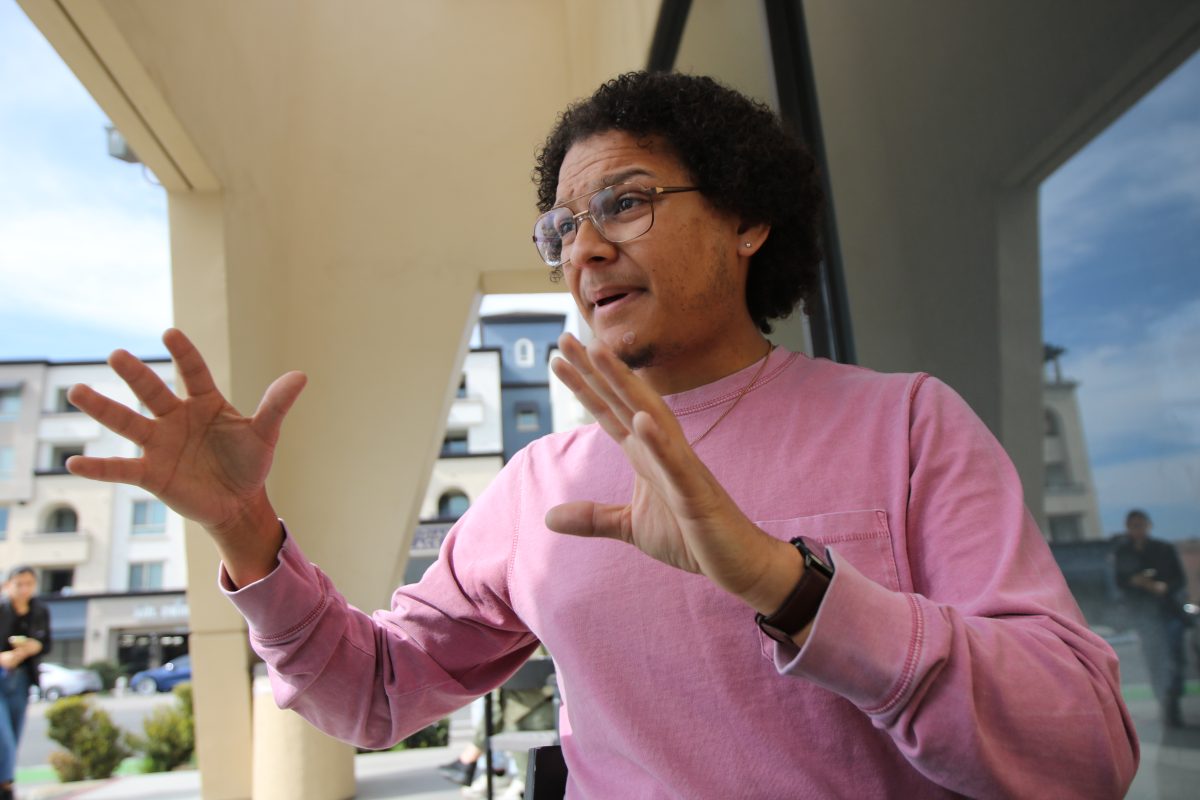
Associated Students elections kick-off will take place today from 11 a.m. to 2 p.m. on Bayramian Lawn. Polling booths and electronic voting will be available Wednesday and Thursday from 8 a.m. to 7 p.m. on the Oviatt Lawn and at www.csunas.org/elections. The elections committee says results from the presidential and senatorial races will be available Thursday evening, the latest Friday morning.
Amanda Flavin’s bid for Associated Students president rests on a business-oriented mind and insider knowledge acquired through years of participation in A.S. – from 3 years employed by the recreation division and one year as business and economics senator.
Flavin, 22, chairs external affairs and policy committees and says she would restructure A.S. to make the entity more effective, if elected.
“Some committees are not structured as they should be,” she said. “Senators need to interact more with their constituents.”
In an effort to make this a reality, Flavin said she will require senators to attend multiple club meetings and report back to the senate body.
Flavin said she will tackle the budget crisis by using state and national resources to advocate for students.
“We cannot sit idly by, we need to be (proactive),” she said. “Whether it be through better lobbying in Sacramento, letter writing, campaigning or bringing politicians to campus.”
Born and raised in the San Fernando Valley, Flavin commutes to campus and said one of her top priorities as president would be the creation of a transfer student center.
“Many of CSUN’s students are non-traditional,” she said. “They’re over 25 years old, some are first generation (college students) and a lot are transfers.”
Among her successes in the senate, Flavin notes her bid for and achievement of a larger marketing budget.
“I hope to build a better relationship between A.S. and clubs and organizations,” she said. “In order to do that, we must increase communication and publicity of events to target interested students.”
The business law major said she plans to attend law school and earn a simultaneous business masters degree after graduating next spring.
Flavin said after a semester taking 17 units, working 20 hours and serving on A.S. senate, she could handle the role as president.
“I would be the best candidate because I have the most experience,” she said. “Between Sydni (Powell) and I, we sit on every major committee.”
Sydni Powell describes her work with Associated Students as “behind the scenes” and said she wants to continue her service to CSUN students through a more public role.
Powell grew up in Bakersfield and lives on campus. She serves on the academic technology and food advisory committees where she represents, at times the only, student voice and said if elected she would make sure there is a student voice on every campus committee.
“Amanda (Flavin) will handle things on a macro level, I am more micro,” she said.
Powell said that while her running mate will address statewide and national issues facing CSUN students, she will focus on individuals’ experience on campus.
“I will make sure the campus is heard on its own campus,” she said.
Powell sat on the senate body when student protestors expressed their disappointment in A.S.’s involvement during the March 2 demonstrations and said A.S. can improve its publicizing and involvement.
“We need to increase communication and open dialogue,” she said. “Sometimes as student-leaders, we think students don’t want to hear our message. Students have to want to hear it and we need to find out what they want to hear.”
Powell serves on the USU board of directors and has helped allocate space for LGBT and veteran resource centers and a bicycle co-op, the voting for which will occur within the next couple months.
Regarding the budget, Powell said the first step is in educating the student body through literature and references to online information.
“Students need to be autonomous and take control of their education,” she said. “I won’t just tell them the answers, I will show them where they can find the answers.”
Upon graduating in 2013, Powell plans to attend graduate school and plans to become a software engineer who creates learning tools for young students.
“I want to continue (serving students) on a larger scale and make sure that leadership continues to grow and has as much compassion for this campus as I do,” she said. “I don’t want students to have to say ‘Why weren’t you there?’”
John Ryan Biltz, 20, said after his term as senator at large was dissolved in legislation last year, he decided to continue his service in A.S. politics and complete unfinished business.
The political science major from Riverside serves as vice president of Zeta Beta Tau, A.S. senator-at-large and on the policy committee, and has participated in ballroom dancing and intramural soccer clubs.
He said his role as an at-large senator allowed him to focus on a specific goal: attracting smaller clubs and organizations into the CSUN community.
“I helped the geology club get funding to go to Iceland and I’ve helped get the nutrition club running,” he said.
Biltz said he would increase marketing and funding to specific groups on campus that could help buoy the student body into partipation, citing the Greek system and CSUN’s cultural groups as large enough entities to achieve this goal.
In reference to the budget crisis, Biltz said he would increase CSUN’s activity with the CSU lobbying body California State Students Association (CSSA) and continue sending students to Sacramento.
“We don’t only need to focus on budget cuts, but on programs that already exist” he said. “I’d like to increase the SPACE marketing budget for larger events, such as the Big Show.”
Biltz said he thinks A.S. does “fairly well at marketing their events” to students, but they could always do more. He claimed that lack of participation may not lie in communication, but in student interest.
“Most students come to campus, go to class and go home,” he said. “That’s not a college experience.”
If elected, Biltz said he would create a marketing resource center where A.S. would provide subsidized or free printing, banners, design for clubs to publicize their programs.
He also said that after A.S. Recreation moves to the USU, his adminstration would use those funds to create an “open fields program” – a time allotted for students to use outdoor campus space for recreation or intramural sports.
“I like to think I’d be a good president because I am fairly receptive to students’ needs and I understand the role of a leader,” Biltz said.
As a transfer student, Anthony Castro said serving as A.S. vice president would help him correct several issues he experienced while transitioning to CSUN.
“I noticed concerns that could be fixed,” the child adolescent and development and accounting double major said. “But not everyone gets heard.”
He says one of his priorities is to bring a transfer center to campus to help students adapt to CSUN.
Castro, 22, transferred to CSUN from UC Berkeley in fall 2010. He served as freshman coordinator for UC Berkeley’s Latino Business Student Association (LBSA).
Castro said he increased freshman enrollment in LBSA “ten-fold” by creating a website, generating ad revenue and disseminating literature.
Upon coming to CSUN, Castro joined the Zeta Beta Tau fraternity and served as health and human development senator during spring 2011.
During his term, Castro has sat on the internal affairs and SPACE committees, planning events and promoting school spirit. He said communication between A.S. and campus clubs and helping curtail the effects of budget cuts are his top priorities.
“We need to send more representatives to (lobby) at local, state and national levels,” he said.
Castro said he will focus on how students can benefit directly from loosened financial strains, such as free transit subsidies for all CSUN students.
“At UC Berkeley, we paid $2 a semester and that gave the entire student body free busing,” he said. “I want to bring that here.”
Castro plans to earn a masters in business law upon graduating in spring 2012 and said he wants to enter educational politics on a national level.





